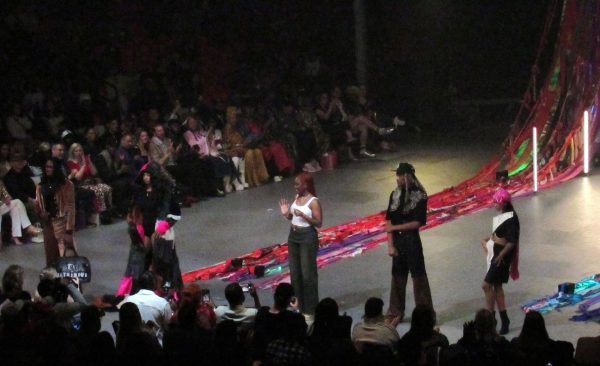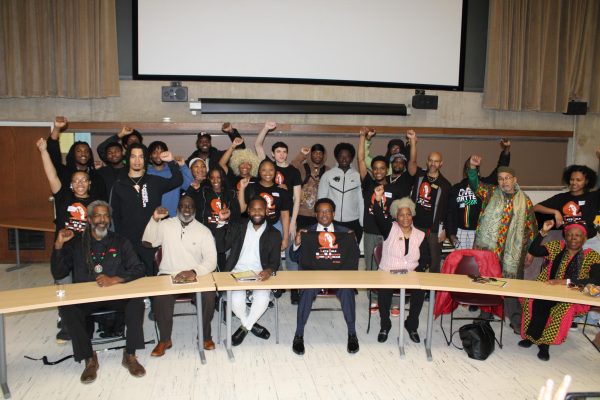Screening brings awareness of cultural gender barriers to students
It’s hard to believe that at one point in American history, women weren’t allowed to vote and were expected to do the bulk of their work from a kitchen. Times are changing, but some cultures around the world are not as advanced when it comes to gender equality.
March is Women’s History Month, and to honor the inspirational and courageous women who have made great contributions to the world, SUNY Buffalo State’s office of equity and campus diversity is hosting a series of events on campus to celebrate them.
This month’s activities included a screening of the movie “Salma,” as part of a new film series project that Jason Parker, diversity program coordinator, and media productions professor Ruth Goldman have introduced this semester at Buffalo State. Every month, they showcase a film on campus. Last month, they drew in a crowd of nearly 70 people with their screening of “American Promise.”
Last Thursday in the student union, students were introduced to “Salma,” a story by documentary filmmaker Kim Longinotto, about a Tamil woman in India. At 13, her Muslim parents locked her up in an incarceration that lasted almost 25 years. In accordance with the tradition of her village, she was forced into an arranged marriage as a teenager while locked away.
Salma’s story represents the lack of freedom still experienced by young girls and women in some parts of the world today. The film also depicts her resilience – she secretly wrote poetry and smuggled it out of her home with the help of relatives, which led to her publishing a book of poems about her experiences and frustrations.
According to Parker, women have played a valuable role in moving the country to where it is today and, since WWII, have been taking on bigger roles. Parker hopes to inspire the students on campus with the story of Salma, especially the females.
“I want them to have a perspective that women can do anything that a man can do,” Parker said. “And for them to understand that they are as sharp and capable.”
Parker was excited to screen Salma because it pertains to an important message he believes Americans need to understand.
“This film stuck out to me,” Parker said. “We take for granted some of the things we have and I’m always a big advocate of showing people how good we have it.”
Goldman said she chose this film in particular after contacting the non-profit distribution company, Women Make Movies, and asked for recommendations for a Women’s History Month screening, and after learning about the film, both she and Parker were profoundly affected by the story.
Goldman hopes that anyone who sees the film is able to understand it in a global perspective without feeling that one culture is superior to another – instead understanding that girls and women have different social struggles and barriers all over the world.
“While we have certain basic rights in this country, women are still far from equal to men in terms of access to education, jobs, wages and health care,” Goldman said. “And that’s just to name a few.”
According to her, there are so many institutional and cultural barriers that can hold women back. But at the same time, this film tells the very real story of a woman who refuses to give up her dream of being a writer, even in the face of unbelievable adversity.
Goldman said the screening went well. They didn’t have as big of a crowd as the first screening of “American Promise,” but they had an excellent discussion afterwards.
“It is the kind of film that stays with you for days,” Goldman said. “So I hope conversations are continuing and I encourage anyone who didn’t make it to the screening to request the film through Netflix.”
Many participants were intrigued by the film and thought it went well with this month’s theme.
Media production associate professor Meg Knowles called the film “enlightening” and said that everyone who saw the film was moved by the courageous stand Salma made to take ownership of her life and experiences, despite personal risks in the process.
“The film was a great choice for Women’s History Month because it creates awareness of women whose stories are wildly different from our own, but share a common spirit of creativity, leadership and expression,” she said. “(Salma) sets an example of strength and vision that everyone can be inspired by.”
Adza Beda, a senior communication studies major, said she enjoyed watching “Salma,” adding that it illustrated a lifestyle in a small sect of Indian culture that is vastly different than what she is accustomed to seeing.
Beda was inspired watching a really strong and determined woman overcome the pressures of an oppressive culture where woman are locked up as soon as they get their first menstrual cycles.
“Through all those horrific factors, Salma found a way to release her poetry,” Beda said. “Through that she is changing lives for her country, as well as the world.”
Beda said she hopes to be able to act as strong as Salma, if the time ever comes where she needs to stand up for herself as a woman in today’s society.
“The film inspired me because it shows the sacrifice and fortitude one must have to make a major influence across the world,” Beda said. “I hope that I have as much courage as Salma when I am faced with great adversity.”
Email: [email protected]






